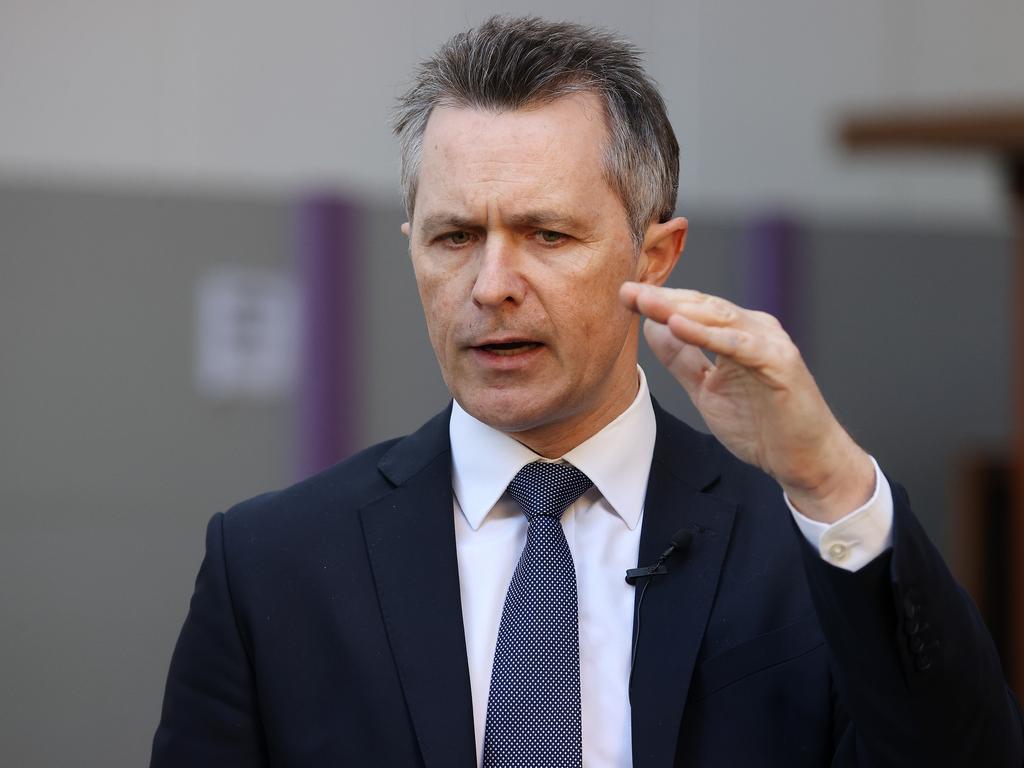Low bar to entry under university reform
Students with poor high school grades will be encouraged to go to uni and a career path that is wrong for them, experts warn.

Students with poor grades in high school will be encouraged to go to university and set on a career path that is wrong for them, experts warn, under sweeping recommendations in the federal government’s higher education review that are coming under fire from vice-chancellors.
One higher education expert warned that students with ATARs as low as 45 could make it into university under the blueprint for the sector outlined in the Universities Accord review’s final report, released by Education Minister Jason Clare on Sunday.
The biggest review of tertiary education in 15 years has called on the Albanese government to double the number of university places in the next 25 years, reduce the high fees students pay in some subjects and reform the HECS loan scheme to ease the financial impact on graduates.
The recommendations in the review will cost tens of billions of dollars over the next 25 years if fully implemented. They aim to create a highly educated workforce, with more than 55 per cent of 25 to 34-year-olds having a bachelor degree or above by 2050.
The review recommends more government funding to dramatically increase the number of disadvantaged students from poor backgrounds and regional areas at university.
“At the moment almost half of young people in their 20s and 30s have a uni degree. But not … in the outer suburbs … not in our regions. And the accord is about changing that,” Mr Clare said. Although the report was welcomed by most universities, Australian National University higher education expert Andrew Norton warned the attendance target meant that students with an ATAR of only 45 would be going to university,
“Historically most students with ATARs below 50 don’t go,” Professor Norton writes in The Australian. “Those who do, face a high risk of dropping out, and if they finish a reduced chance of getting a well-paid job. Nobody should be encouraged to take courses that probably won’t leave them better off.”
While most of the recommendations are uncosted, Australia’s three wealthiest universities – Sydney, Melbourne and Monash – have slammed a key proposal to tax university income and redistribute resources from richer institutions to poorer ones.
The report calls for all universities to pay an impost on “untied” revenue they earn through their own efforts, including international student fees, unsubsidised domestic student fees, interest and investment income, and business earnings.
The tax, which will fall mainly on universities with high international student income, will contribute half of a $10bn investment in the Higher Education Future Fund, to pay for university infrastructure including campus buildings and student accommodation. The $5bn raised in tax would be matched by the government.
Monash University vice-chancellor Sharon Pickering said the future fund plan would interfere with universities’ ability to deliver on the accord review’s goals of increasing numbers of disadvantaged students and building the workforce skills needed in a modern economy.
University of Melbourne vice-chancellor Duncan Maskell said he was concerned by the proposal. “A new tax on universities will weaken Australia’s current and future productivity, innovative potential and prosperity,” he said.
University of Sydney vice-chancellor Mark Scott, who is also chair of the Group of Eight universities which benefit most from international student fees, said the future fund tax plan “would hurt our reputation and our capacity to attract international students”.
The report made no recommendations on the level of the tax but said it should only commence once a new university funding system was in place and should cease when $5bn had been raised.
It would mainly affect five of the Group of Eight universities which have large numbers of high fee paying Chinese students – Sydney, Melbourne, Monash, UNSW and Queensland.
Western Sydney University vice-chancellor Barney Glover, a member of the accord review panel, said the fund was “important future proofing for the sector” but there was “work to do on design and timing”.
On Sunday Mr Clare said he had an open mind on the tax and the future fund, and would decide over the next weeks and months. “There are some universities who hate it, there are other universities who love it,” he told the ABC.
The review called on the government to reduce the high fees student pay in some subjects, and reform the HECS loan scheme to ease the financial impact on graduates. The review says high university fees of over $16,000 a year in some fields – including humanities, communications, and other society and culture subjects such as human movement – should be reduced.
It also urged reforms to HECS to ease the effect high inflation has on increasing the amount students owe and to reduce the financial impact on HECS debtors when their income first hits the loan repayment threshold.
The report says banks lending practices should be reviewed so people don’t have their home loan borrowing capacity unduly affected by HECS debt.
The review panel, headed by former NSW chief scientist Mary O’Kane, makes 47 recommendations for reforming tertiary education, aimed at dramatically increasing the number of Australians who continue education after finishing school.
The review recommends a goal of having 80 per cent of working age Australians with at least one tertiary qualification (vocational or higher education) by 2050 compared to 60 per cent at the moment.
It urges the government to set an achievement target of having 55 per cent of 25 to 34-year-olds holding a bachelor degree or above by 2050, compared to 45 per cent now. This will require a doubling of commonwealth supported university places for domestic students from 860,000 in 2022 to 1.8 million in 2050.
The review says universities should get more government funding for educating students with higher needs, such as those from low socio-economic status backgrounds, from regional and remote areas, and Indigenous students.
The review also calls for more innovative types of courses such as micro-credentials and degree apprenticeships, payments to students for compulsory internships, free university preparatory courses, higher living allowances for needy students, better recognition of prior learning for people starting qualifications, and a “jobs broker” to help students find part-time jobs while they are studying in the area of their course.








To join the conversation, please log in. Don't have an account? Register
Join the conversation, you are commenting as Logout